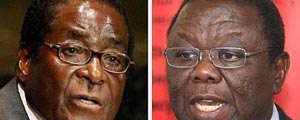
President Robert Mugabe and Prime Minister Morgan Tsvangirai’s Christmas and New Year messages acknowledge that political violence remains a big challenge for Zimbabwe.
NewsDay Editorial
For the past two years, this country has been in election mode as Mugabe and Zanu PF continued to press for fresh elections despite evidence that nothing has been done by the inclusive government to prevent a repeat of the 2008 bloodshed.
Talk of elections nowadays evokes memories of the violence blamed on State security institutions that have up to this day not attempted to prove that they were not responsible.
Therefore, 2013 will provide a stern test for this country’s leadership, as it is now almost certain that there will be an election whether in March or any time before the end of 2013. Mugabe implored Zimbabweans to use the festive season to reflect on the need to denounce violence ahead of the polls.
“We want to look back and say our inclusive government was indeed a producer of an election that had been very peaceful and violence-free, and very productive, because the government that came out of it is a government of the people that has learnt their lessons from a people that was united and a people that moved progressively,” he said.
Tsvangirai, seen as the biggest victim of the 2008 mayhem, also had a similar message, singling out political violence as one of the biggest challenges that are likely to face this country next year.
Although both men have uttered encouraging words, we need to remind ourselves that these two are principals in the inclusive government who had an ambigous mandate to build strong institutions that could ensure the authorities on both sides brought an end to the disturbing culture of political violence.
- Chamisa under fire over US$120K donation
- Mavhunga puts DeMbare into Chibuku quarterfinals
- Pension funds bet on Cabora Bassa oilfields
- Councils defy govt fire tender directive
Keep Reading
Through the Organ on National Healing and Reconciliation, Mugabe and Tsvangirai’s coalition was expected to address the root cause of the violent behaviour that sadly had its genesis in the first democratic elections in 1980.
The inclusive government was also expected to reform State institutions that were fingered in past election-related violence such as the army, Central Intelligence Organisation and the police. However, Mugabe and Zanu PF remained adamant in their opposition to proposed security sector reforms.
Some generals even became more blatant in their interference in political processes and now there are disturbing reports that soldiers have been deployed in the countryside to drum up support for Zanu PF. Yet Mugabe’s calls for people to refrain from political violence remain generalised and never address real causes.
His statements never speak to known perpetrators of violence.
Reports of both Zanu PF and MDC-T supporters engaging in political violence are still common, which is an indication that their leaders are not doing enough to fight this scourge.
So the big question as we reflect on statements by Mugabe and Tsvangirai is: Are their supporters listening?











